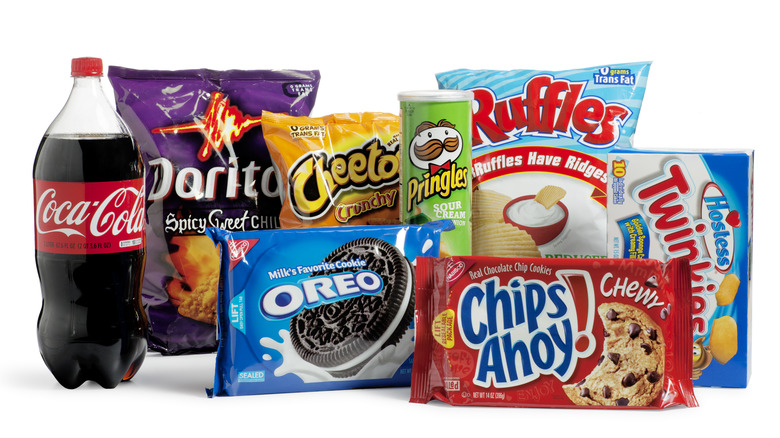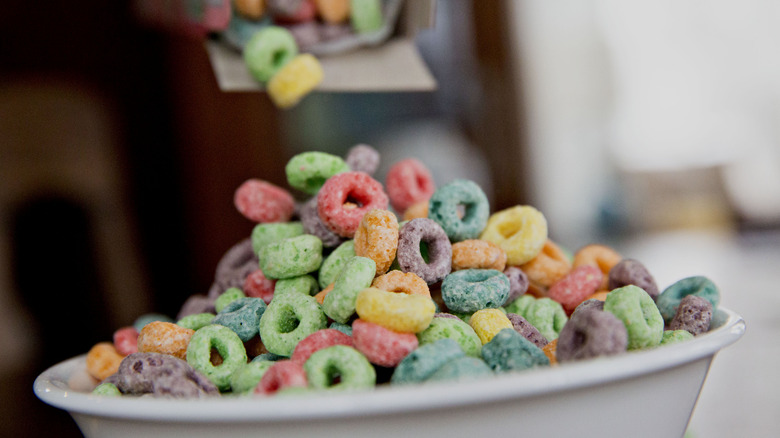The Ingredients You'll Never Find In Aldi Brand Products
You already know Aldi sells affordable food. But did you know it sells food free of several controversial ingredients, too? You'll never find partially hydrogenated oils, synthetic colors, or monosodium glutamate (MSG) in Aldi brand products. The grocery chain banned the ingredients from its own-brand food products in 2015. "Our decision to remove these ingredients from all of our exclusive brand foods delivers on our ongoing commitment to meet the evolving preferences of our customers," said Jason Hart, CEO of Aldi USA, in a statement at the time (via PR Newswire).
In fact, partially hydrogenated oils had to go anyway. The FDA banned them; Aldi simply phased them out before the mandatory cut-off in 2021. But MSG is perfectly legal, and, according to researchers, safe. Some people just prefer to avoid it. Certified synthetic colors, also known as artificial colors or food dye, are a more controversial additive. They're FDA-approved but are known to be associated with a number of health risks. By cutting these controversial ingredients out of its own-brand products, Aldi earned points with additive-conscious customers.
Are food dye and MSG really dangerous?
Japanese chemist Kikunae Ikeda figured out how to isolate MSG, a naturally occurring umami bomb, in 1908. Ever since, food manufacturers have added it to their products — because it tastes great. But for decades, the rumor persisted that MSG could cause headaches and nausea. In blind studies, researchers haven't been able to replicate these effects (via The National Library of Medicine). Still, some people feel it triggers a reaction and would rather eliminate it from their diet.
Synthetic food dyes, on the other hand, are made from petroleum. (Mmm.) They are found in everything from cake mixes to pickles. It's possible to have an allergic reaction (via the Center for Science in the Public Interest) to all three of the most common dyes in the American food system: Red 40, Yellow 5, and Yellow 6. Fortunately, food dye allergies are rare.
Most people avoiding food dye are worried about other health concerns. Some studies link them to hyperactivity in children (via Berkeley Public Health). Advocates have also raised concerns about food dye and cancer risk (via The National Library of Medicine). Batches of Red 40, Yellow 5, and Yellow 6 have all been found to be contaminated with carcinogens; Red 3 increased the risk of thyroid tumors in rats. Most major health organizations agree that the amount of food dye people consume in a normal diet is of little-to-no health concern, however, according to Healthline.
Name brand foods with dye-free substitutes at Aldi
Does this mean that shopping at Aldi is a shortcut to cutting out food dye and MSG? The short answer is yes. Only Aldi's own brands — like Appleton Farms and Simply Nature — are covered by the ban on artificial additives. But over 90% of the food on Aldi shelves is private label. If you see a name brand, check the ingredient list; otherwise, you can rest assured there is no hidden food dye or MSG.
Flamin' Hot Cheetos contain so much red dye they've sent people to the emergency room, convinced they're bleeding to death (according to CBS News). Alternatively, Clancy's Fiery Hot Cheese Curls get their color from annatto extract. Aldi's Cheetos copycat is also cheaper, at $2 per bag instead of $4. Kellogg's Froot Loops contain several artificial food dyes (shocker); Aldi's Froot Loops copycat, Millwill Fruit Rounds, contains zero, and shoppers love that about it. Aldi sells dozens of other additive-free copycat products that taste like the real thing.


